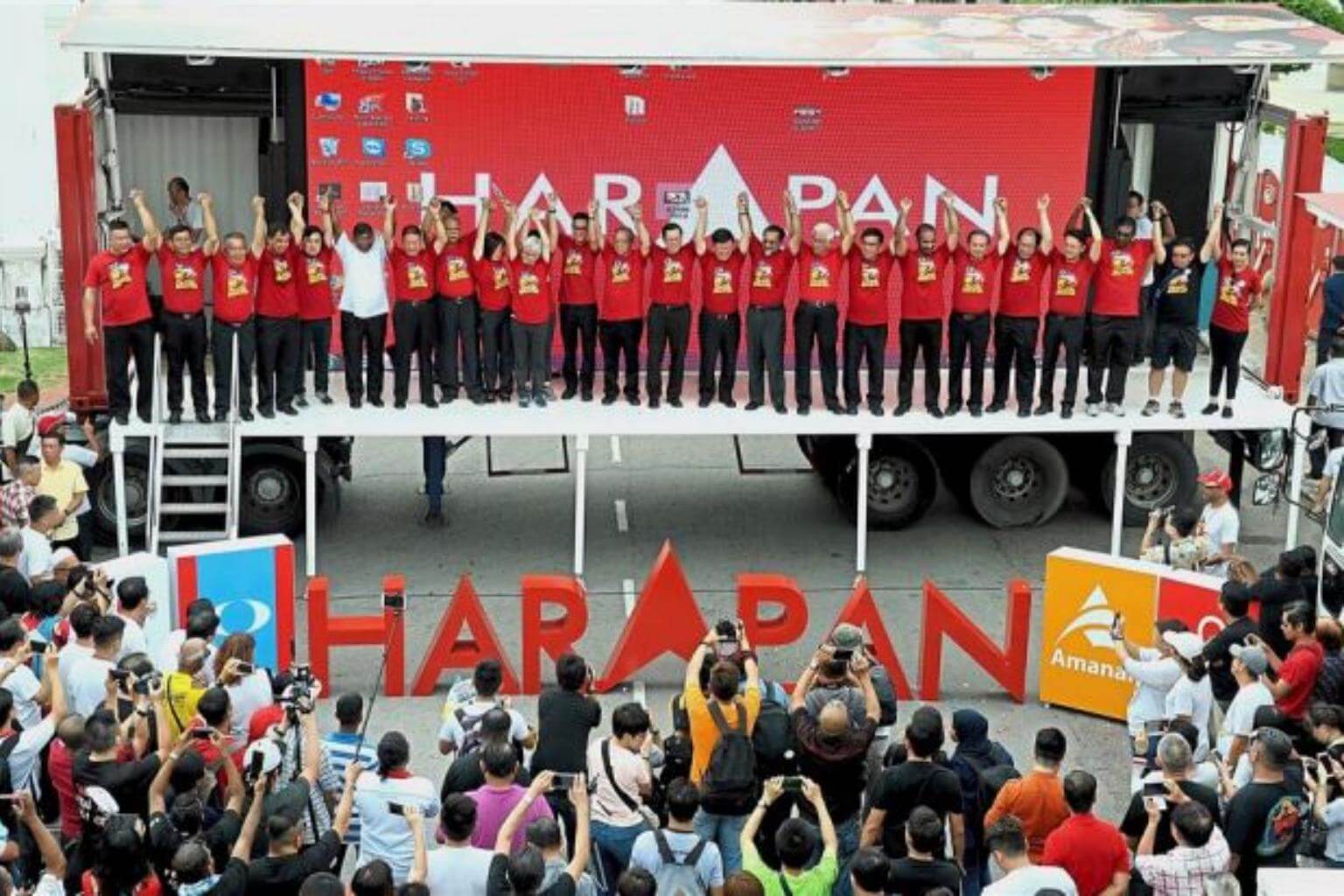A closer look at Pakatan Harapan's manifesto: Sin Chew Daily columnist
In his commentary, the writer expresses hope that Pakatan Harapan's (PH's) election manifesto will exert some pressure on Barisan Nasional and encourage healthy competition between the two parties.
Sign up now: Get insights on Asia's fast-moving developments

Pakatan Harapan leaders posing for photographs on a mobile stage at the Esplanade in George Town.
PHOTO: THE STAR/ASIA NEWS NETWORK
KUALA LUMPUR (SIN CHEW DAILY/ASIA NEWS NETWORK) - The election manifesto announced by Pakatan Harapan (PH) has been very comprehensive, including many reform proposals that puts the opposition pact ahead in the race to reform the country vis-à-vis the ruling coalition which is relatively lethargic in bringing new reforms.
But, if we were to carefully inspect the manifesto, we can find positive as well as negative aspects of it, some gearing towards the country's needs but others appearing to be dislodged from reality.
While the abolition of Goods and Services Tax (GST) within the first 100 days in office might sound very appealing, given the fact that the Barisan Nasional (BN) administration collected RM44 billion (S$14.8 billion) from GST and the heavy reliance of government operating expenses and subsidies on the GST, PH will need to find a new source to make up for the shortfall to ensure the country's finances will not get out of hand.
Although PH will bring back the sales tax, but this will only bring in RM16.5 billion, with a shortfall of about RM27.5 billion.
As such, the most effective solution is to cut operating expenses.
Unfortunately, PH does not seem to have such a plan, and has made no mention of manpower cut.
Revoking GST is a good thing, but there must be some practical solutions to ensure smooth transition to the age of "zero GST".
PH pledges to provide fuel subsidies to the needy groups in a bid to reduce the financial burden of low-income families.
BN has earlier proposed a fuel subsidy system but has to drop it due to presence of loopholes.
PH has proposed to provide petrol subsidies for motorcycles under 125cc and cars under 1,300cc, as well as a subsidy mechanism based on MyKad (Malaysia's national identification card) information.
But these are subject to abuse and some may even sell subsidised fuel or MyKad information for a profit.
It is not wrong for PH to boost the rakyat's (the ordinary people's) income from the RM1,000 minimum wage to RM1,500 within five years.
Even though the PH government will bear RM250, the additional RM250 will be borne by the employers, and this is going to be a substantial burden for them.
PH should first draw up a detailed blueprint to lower the operating cost of employers so that the objective could be met without them resorting to layoffs.
Quite a substantial part of PH's manifesto has been an extension of BN's subsidy mechanism.
For instance, even as former premier Dr Mahathir Mohamad once dismissed BR1M (1Malaysia People's Aid - a scheme of the current government to ease the burden of lower income groups in Malaysia) as bribery, the same has been retained by PH for the sake of votes.
Other subsidies include RM500 basic medical allowances for the B40 group (bottom 40 per cent), RM150 cash payout for senior citizens above 60 years of age, and cost of living subsidies for public university students from low-income families.
In addition, PH's election manifesto is widely perceived as trying to please the voters, including generous measures for youngsters, Felda (Federal Land Development Authority) settlers, women, senior citizens, Chinese and East Malaysian people.
Of course, the Malay agenda is very much on the mind of PH, including increased bumiputra equity.
That makes it not much different from BN's fiscal budget.
And it appears to many that PH is still very much hooked on to BN's generous payout policy.
While PH has offered some economic stimulus plans, it fails to review the racial policy.
It touches on enhancing the role and powers of local governments but nothing has been said of restoring local government elections.
Despite all these shortcomings, the PH election manifesto nevertheless does have its farsighted and positive aspects, including its pledge to carry out systematic reforms, restoring the dignity of national institutions, limiting the term of prime minister, restructuring the prime minster's department, reform the Malaysian Anti-Corruption Commission (MACC), separating the offices of chief prosecutor and attorney-general, reforming the electoral system, restoring Malaysians's faith in the judiciary, restoring the federal spirit and abolition of draconian laws.
The recognition of the Unified Examination Certificate (UEC) is bound to satisfy the expectations of the local Chinese community, while the abolition of draconian laws such as the Sedition Act 1948, Universities and University Colleges Act 1971, Printing Presses and Publications Act 1984, and the National Security Council Act 2016 will further promote democracy and liberty.
Meanwhile, the establishment of Independent Police Complaints and Misconduct Commission (IPCMC), and pledges to safeguard human rights will further lift the country's international image.
These are things the BN government has failed to deliver.
The BN administration has lost steam to bring about meaningful reforms ever since the eruption of the 1MDB scandal.
We therefore hope that PH's election manifesto will exert some pressure on the BN to effectuate a healthy competition between the two rival camps.
Perhaps in the end BN will only stick to populist and development strategies to counter PH's ten promises for the first 100 days in office and 60 promises to be fulfilled over five years.
The question now is what the rakyat need most now and whom they are going to believe more.
Sin Chew Daily is a member of The Straits Times media partner Asia News Network, an alliance of 23 news media entities.


